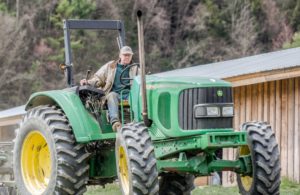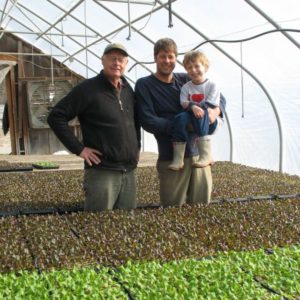
The Harlows have been farming in Westminster, Vermont, for over a century.
By Lauren Moore, USDA
The Harlow family has been growing vegetables on their farm in Westminster, Vermont, for over a century.
Paul G. Harlow bought the property in 1917, where the family milked cows and sold vegetables at a roadside stand. Now, 102 years and three generations later, Harlow Farm is a certified organic operation, producing a variety of vegetables, cattle, hogs, and poultry.
Improving the Operation
From a young age, Paul helped his father around the farm. He purchased the farm from his family in 1975 after he graduated from college.
Paul remarked that the soil in the Connecticut River Valley provides “excellent growing conditions” for their vegetables. Lettuce is one of their largest crops, followed by beets, carrots, sweet corn, squash, kale, and cabbage.
The Harlow family works with USDA’s Natural Resources Conservation Service to implement nutrient management and pest management plans through the Environmental Quality Incentives Program. They have also added an irrigation system, pipeline, a high tunnel, and established cover crops with the program.
EQIP provides agricultural producers with financial resources and one-on-one help to plan and implement conservation practices. Using these practices can lead to cleaner water and air, healthier soils, and better wildlife habitat, all while improving agricultural operations.
Fresh from the Farm
Products from the farm are sold at the Harlow Farmstand and shipped wholesale throughout New England and as far south as Florida.
The stand opened in 1991 and is operated by Paul’s brother, Dan. It features not only Harlow’s products, but fruits and vegetables from other local farms.
Visitors can also enjoy the farm’s on-site restaurant, which serves a variety of menu items for breakfast, lunch, and dinner.
Overcoming Disaster
“Vegetable farming in Vermont is never short of challenges,” said Paul.
After Hurricane Irene took a turn up to New England, the Harlows enrolled their eligible crops in Noninsured Crop Disaster Assistance Program with the USDA Farm Service Agency.
“After Irene, we had significant losses, so I started to look further into the program,” Paul said. “With the way things are in our environment, it’s imperative that we are covered.”

USDA offers a range of programs to help family farms thrive.
NAP provides financial assistance to producers of noninsurable crops when low yields, loss of inventory, or prevented planting occur due to natural disasters. In 2017, the program helped Harlow Farm recover from a hailstorm that destroyed the farm’s crops.
More Information
USDA offers a variety of risk management, disaster assistance, loan, and conservation programs to help agricultural producers across the country weather ups and downs in the market and recover from natural disasters as well as invest in improvements to their operations. Learn about additional programs.
For more information about USDA programs and services, contact your local USDA service center.





